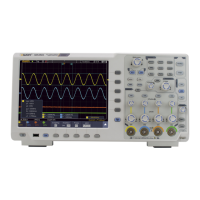4.Advanced User Guidebook
Best solution for frequency, worst for
magnitude.
Best type for measuring the frequency
spectrum of nonrepetitive signals and
measuring frequency components near DC.
Recommend to use for:
⚫ Transients or bursts, the signal level before
and after the event are nearly equal.
⚫ Equal-amplitude sine waves with
frequencies those are very close.
⚫ Broadband random noise with a relatively
slow varying spectrum.
Best solution for magnitude, worst for
frequency.
Recommend to use for:
⚫ Single frequency waveforms, to find higher
order harmonics.
Good for magnitude, but poorer frequency
resolution than Hamming.
Recommend to use for:
⚫ Sine, periodic and narrow band random
noise.
⚫ Transients or bursts where the signal levels
before and after the event are significantly
different.
The frequency resolution when using the
Kaiser window is fair; the spectral leakage and
amplitude accuracy are both good.
The Kaiser window is best used when
frequencies are very close to the same value
but have widely differing amplitudes (the side
lobe level and shape factor are closest to the
traditional Gaussian RBW). This window is also
good for random signals.
The Bartlett window is a slightly narrower
variant of the triangular window, with zero
weight at both ends.

